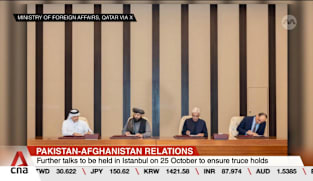Muhammad Faishal Ibrahim on risks of youths radicalising via gaming, chat and social media platforms
The number of self-radicalised youths has increased and they are getting younger, said Minister of State for Home Affairs Muhammad Faishal Ibrahim. Replying to an MP's questions in Parliament on Monday (Mar 6), he said from 2007 to 2014, only one self-radicalised youth aged 20 was detained under the Internal Security Act (ISA). Since 2015, there have been 11 self-radicalised youths aged between 15 and 20 who were detained or issued with Restriction Orders under the ISA. They were exposed to extremist and radical content through a variety of online platforms. Dr Faishal said the Government has blocked access to some websites that perpetuate extremist messaging and ideologies and strengthened the laws to combat online criminal harms. But it is not possible to block all extremist content, given the vastness of the Internet, he said. With extremist content and new sites constantly popping up, determined individuals will find ways to circumvent the Government’s actions, he said. As such, the Government has also been working with community partners to strengthen resilience against extremist ideologies. The public, particularly family members and friends, also plays an important role by seeking help for someone close to them whom they are concerned has been radicalised or reporting suspicious behaviour, he said. He stressed that early reporting would allow the authorities to intervene quickly to avert a tragedy, including to the radicalised person. If the person is only in the early stages of radicalisation, he or she may be referred for counselling and may not need to be detained under the ISA.
The number of self-radicalised youths has increased and they are getting younger, said Minister of State for Home Affairs Muhammad Faishal Ibrahim. Replying to an MP's questions in Parliament on Monday (Mar 6), he said from 2007 to 2014, only one self-radicalised youth aged 20 was detained under the Internal Security Act (ISA). Since 2015, there have been 11 self-radicalised youths aged between 15 and 20 who were detained or issued with Restriction Orders under the ISA. They were exposed to extremist and radical content through a variety of online platforms. Dr Faishal said the Government has blocked access to some websites that perpetuate extremist messaging and ideologies and strengthened the laws to combat online criminal harms. But it is not possible to block all extremist content, given the vastness of the Internet, he said. With extremist content and new sites constantly popping up, determined individuals will find ways to circumvent the Government’s actions, he said. As such, the Government has also been working with community partners to strengthen resilience against extremist ideologies. The public, particularly family members and friends, also plays an important role by seeking help for someone close to them whom they are concerned has been radicalised or reporting suspicious behaviour, he said. He stressed that early reporting would allow the authorities to intervene quickly to avert a tragedy, including to the radicalised person. If the person is only in the early stages of radicalisation, he or she may be referred for counselling and may not need to be detained under the ISA.



















